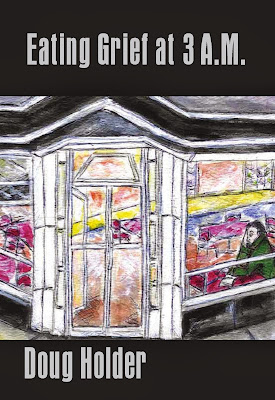The
Poet of Schools
By
Ken Zegers
Dos
Madres Press
Loveland,
Ohio
34
Pages
Review
by Dennis Daly
Kip
Zegers proffers, in his modest but compelling book of poems entitled The Poet
of the Schools, pedagogical revelations of a very high order. His pieces eschew
the standard slice- of- life fare for deeper, more psychologically based
insights into teacher-student relationships. Some of these insights appear
momentary, a chance perception, a fleeting acuity; others continuously draw you
in to a nexus of awareness and sensitivity. But, be warned, this is not the Stand
and Deliver world of Jaime Escalante with its optimistic logic and neat packet
of inspiration. Rather, Zegers inspires by recording the little miracles which
happen along the way during and sometimes in spite of the educational process. Apparently, this high school teacher of 29
years reinvents himself each September to match his students’ needs. Zegers
aptly titles the first section of his book Busy Being New. He means it.
From
the collection’s opening poem, The Pond in Room 318 Zegers makes it clear where
he’s going—fishing. He brings poetry as bait. He tries to hook those students
with that spark of curiosity that every good teacher looks for, indeed, craves.
This is how the poem begins,
In
that room, Fall was a green surprise.
Entering
class was paddling out
on
a windy surface. I’d brought
a
rod and reel and thought I had the perfect
poems
to fish with. I lost them the first day,
but
new tools rose to hand, proving
or
disproving themselves by use.
Life
in that room obeyed laws.
Not
only do schools seem to have their own natural laws, they also have their own
seasons. Autumn is the spring, the planting season Winter for growing, Spring
the harvest time, and Summer, a time of emptiness. The poet puts it this way,
Fall
is its fresh beginning, winter
Its
abundance, spring the harvest,
And
summer an empty field
The
children are leaving…
If
this sounds a bit like Peter Sellers’ Chauncey Gardiner in the movie Being
There so be it, but it is a pretty cool metaphor nonetheless.
The
poem Listening In begins with an extraordinary scene. The teacher takes a book
, a fantasy novel, from his student. The student reacts with an autistic
tantrum. The poem goes on detailing one after the other telling moments of
student-speak. Here’s one,
…the
8th grade girl
took
perfect notes, kept one hand in the air,
and
narrowed her eyes when I faltered: class
should
be a certain way, a place for “A’s,”
but
her poem saw a homeless man buy
hot
milk tea, a shop where broken hands
hold
warmth. Then the year ended,
and
she doubled back, “I was hoping…
I
would not be forgotten.”
Reverse
engineering, a concept not usually associated with educational theory, let
alone poetic manifestations of teenagers finding their own voice, proves the
perfect metaphor in Zegers’ short poem entitled Krazy Kitchen. The poet says,
Off
with their lids! After a time
what’s
inside the open jars turns green, fuzzy,
and
it’s not mold, it’s apples
budding
from applesauce, grapes
rising
from jelly to the vine. This kitchen
has
worried windows, no recipes,
and
a stove whose pilot light
is
difficult…
Personal
involvement with students weighs heavily on some teachers—the good ones. Zeigers
speaks to this burden in the poem called The Poet Of Schools Is Worried. The
piece begins with him riding the “1” train down the Bronx. Observing the
cityscape he notes the grinding process directed against those innocent souls
who shine with awareness or who have found their voice. The poet continues,
…To
his right he can see red jeans,
a
blue bag, to his left an olive sweatshirt,
and
in his head, hears day old voices, “7 hours
sleep,”
in a boy’s voice, “that’s over 3 nights.”
“Coming
back to school has begun to seem
pointless,”
one girl said. And now,
worry
has arrived in this, the poem.
In
the poem Some Kingdoms Zegers takes a shot at politicians and their seemingly
endless attempts at public education reform. He says,
…politicians,
squirt guns filled
with
money, axes swung from high offices,
smash
things they do not understand.
The
poet of Schools marks his territory,
And
waits.
Later
in the same poem he has a lovely subtle section on both the commonality of
students and their ultimate individuality. Here are the lines,
Behind
the dunes of Jersey, a field
of
swallows. Thousands upon thousands
bend
branches, thicken bushes, and
some
few rise, ready to start south.
It
is not time; they settle, wait.
That
these have thought it over
is
not why they’ve arrived. That all
will
survive is not why they take flight.
Each
lives the species whole. Back
for
a second look, he finds a field,
its
empty air still pulsing.
The
third and final section of the book Zegers entitles The Kenny Poems. The
protagonist, Kenny, goes to a parochial school, circa 1960, 1970 or thereabout.
The culture encompasses good helpings of cruelty, sadism, effective rote
teaching, with an overlay of religious confrontations. That was my experience.
A priest-brute arrives to confront the barbarian children in the second poem of
the series. The sermon given describes a geographical hell with some memorable
images. The priest elaborates,
…”Sin
ends in hell,
and
you boys, you think you know?
Imagine
soft skin on a grill, your white
skin
burning but you can’t move, you boys
all
know what a single match feels like,
but
in hell, when you scream, Satan laughs,
puts
his fork in you and turns you over. Mmm?
I
definitely remember that sermon.
Throughout
the collection Zegers’ sense of wonder strikes you as the perfect counterpoint
to a student’s grappling with language and searching for his own voice. I’ve
heard many of these same themes in prose, but without the intensity. The Poet
of the Schools deserves to be read and read widely.








































